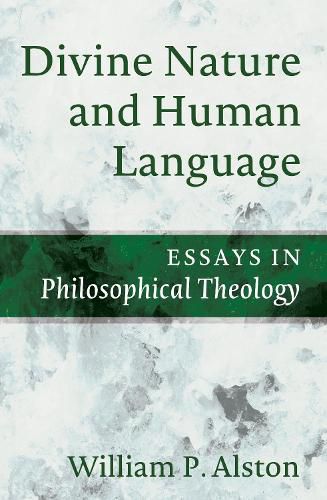Readings Newsletter
Become a Readings Member to make your shopping experience even easier.
Sign in or sign up for free!
You’re not far away from qualifying for FREE standard shipping within Australia
You’ve qualified for FREE standard shipping within Australia
The cart is loading…






This title is printed to order. This book may have been self-published. If so, we cannot guarantee the quality of the content. In the main most books will have gone through the editing process however some may not. We therefore suggest that you be aware of this before ordering this book. If in doubt check either the author or publisher’s details as we are unable to accept any returns unless they are faulty. Please contact us if you have any questions.
Divine Nature and Human Language is a collection of twelve essays in philosophical theology by William P. Alston, one of the leading figures in the current renaissance in the philosophy of religion. Using the equipment of contemporary analytical philosophy, Alston explores, partly refashions, and defends a largely traditional conception of God and His work in the world a conception that finds its origins in medieval philosophical theology. These essays fall into two groups: those concerned with theological language (Part 1 of the volume) and those that deal with the nature, status, and activity of God (Parts II and HI). In Part 1, Alston develops a conceptual scheme for discussing the topic of theological language. He also argues that there is a core of literal talk about God and even a core of predicates univocally applicable to God and creatures. Furthermore, he shows that God can be referred to directly as well as descriptively. In Parts II and III, the author sketches out a middle way between a classical conception of God exemplified by Aquinas and the more recent process or panentheist conception exemplified by Hartshorne. Alston argues that such a God can act so as to have real effects in the world and can enter into genuine dialogue and otherwise interact with human beings. In addition, he defends the idea that God provides a foundation for morality. The first collection of Alston’s ground breaking work in the philosophy of religion, Divine Nature and Human Language will be welcomed by scholars and students of the philosophy of religion, metaphysics, theology, and religious studies.
$9.00 standard shipping within Australia
FREE standard shipping within Australia for orders over $100.00
Express & International shipping calculated at checkout
This title is printed to order. This book may have been self-published. If so, we cannot guarantee the quality of the content. In the main most books will have gone through the editing process however some may not. We therefore suggest that you be aware of this before ordering this book. If in doubt check either the author or publisher’s details as we are unable to accept any returns unless they are faulty. Please contact us if you have any questions.
Divine Nature and Human Language is a collection of twelve essays in philosophical theology by William P. Alston, one of the leading figures in the current renaissance in the philosophy of religion. Using the equipment of contemporary analytical philosophy, Alston explores, partly refashions, and defends a largely traditional conception of God and His work in the world a conception that finds its origins in medieval philosophical theology. These essays fall into two groups: those concerned with theological language (Part 1 of the volume) and those that deal with the nature, status, and activity of God (Parts II and HI). In Part 1, Alston develops a conceptual scheme for discussing the topic of theological language. He also argues that there is a core of literal talk about God and even a core of predicates univocally applicable to God and creatures. Furthermore, he shows that God can be referred to directly as well as descriptively. In Parts II and III, the author sketches out a middle way between a classical conception of God exemplified by Aquinas and the more recent process or panentheist conception exemplified by Hartshorne. Alston argues that such a God can act so as to have real effects in the world and can enter into genuine dialogue and otherwise interact with human beings. In addition, he defends the idea that God provides a foundation for morality. The first collection of Alston’s ground breaking work in the philosophy of religion, Divine Nature and Human Language will be welcomed by scholars and students of the philosophy of religion, metaphysics, theology, and religious studies.